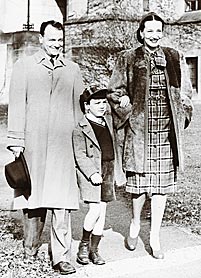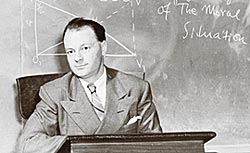Reprinted
with permission from
The ‘father’ of profit-sharing
While teaching
philosophy at
by William P. Hustwit
 I have a
great future behind me," Robert Hartman quipped to the Wooster Daily
Record in April 1946, recalling a life that could have ended in Nazi Germany. A
philosopher and economist, Hartman won national recognition in 1947 – while
teaching philosophy at
I have a
great future behind me," Robert Hartman quipped to the Wooster Daily
Record in April 1946, recalling a life that could have ended in Nazi Germany. A
philosopher and economist, Hartman won national recognition in 1947 – while
teaching philosophy at
Robert
Hartman was born in
As a judge in
From 1932 to
1941, Hartman worked a variety of jobs and changed his name from Robert Schirokauer
to Robert S. Hartman. During those years, he found employment as a photographer
in
In 1938,
Hartman escaped Europe’s growing political unrest and immigrated to
Hartman and
his family moved to the
Hartman
arrived at The College of Wooster in 1945 to begin teaching in the philosophy department.
His family quickly embraced small-town life in
 The post-World War II years and the European
recovery prompted Hartman to begin his most important philosophical thinking.
He realized that the key to ensuring peace and stability in
The post-World War II years and the European
recovery prompted Hartman to begin his most important philosophical thinking.
He realized that the key to ensuring peace and stability in
In a paper
entitled "The Revolution of the Twentieth Century," Hartman urged:
"Compassion, the power of our con science, must grow from a local into a
global power. We could have prevented the catastrophe if our souls had been
strong, our conscience awake, our compassion ardent enough to punish the crimes
as they began – in
The puzzle of
how to bring out the best in people had plagued Hartman for a long time. While
serving as district judge in
Hartman
struggled to answer his questions in such a way that good could be organized to
help preserve and enhance the value of human life. Axiology – the science of
value theory, a theoretical area in which Hartman specialized – helped him find
his answer. Borrowing from several moral philosophers, notably G. E. Moore,
Hartman concluded that "a thing is good when it fulfills its concept."
If an individual thought of himself as a valuable member of a community, then
the good for the individual had been achieved. Hartman set to work organizing
what he observed in communities from his experiences in Europe and the
By 1947, Hartman had organized his philosophical and economic thoughts into an ordered theory for instilling a sense of value in managers and laborers alike: profit-sharing. The concept had been experimented with to a limited extent before World War II. But the needs of the war halted its progressive benefits as industrialists turned their energies to winning the conflict.
After talking
over his ideas with several
The industrialists who met in Orrville endorsed Hartman’s ideas because of his confidence that the right spirit would ensure success among a sincere group of people – not because of his credentials as a college professor. He assured them, "A teacher is a salesman of ideas, and what are you doing in your life work other than selling one great idea and applying one great philosophy, namely ethics, in the industrial life?"
Hartman’s plan called for cash payments to each employee based on the profit of the company and the amount of the employee’s investment. More than anything, Hartman wanted to "explore a way to release the unlimited potentiality of human beings by making workers not only feel a sense of being a partner with owners in business, but in sharing the rewards in a tangible way."
During the
summer, Hartman’s new partners called for a larger meeting in
Hartman found himself at the height of his economic theory’s success. At an October 18, 1947, meeting of The Council of Profit Sharing Industries, Hartman agreed to serve as secretary of the group and turned over the direction of the organization to the industrialists. That same month, The Wall Street Journal reported that two thousand additional business firms had petitioned to join the Council and its profit-sharing scheme. The program envisioned by Hartman and his industrialist partners eventually became the basis for today’s 401 plans.
Although Hartman’s promise as an economic theorist had been fulfilled, his time at The College of Wooster drew to a close. The teaching committee at the College found Hartman to be "free-wheeling in other fields." Hartman’s investment of time in profit-sharing initiatives worried faculty members. In January 1948, Wooster President Howard Lowry received Hartman’s letter of resignation, and The College of Wooster lost its best-known economist.
The success of Hartman’s profit-sharing endeavors sparked a nationwide industrial movement that secured employment for Hartman at a number of prestigious academic institutions. He taught at The Ohio State University (1948-56), M.I.T. (1955-56), and Yale (1966). Upon winning a Fulbright grant, he worked as the Smith Mundt State Department research fellow and exchange professor at the National University of Mexico (1956-1957). He stayed at that university as professor of philosophy until his death in 1973.
His time in
Hartman’s intelligence and passion for extending ethical theory to practical affairs touched the lives of many distinguished twentieth-century philosophers, eight of whom contributed to a book, Value and Valuation: Axiological Studies in Honor of Robert S. Hartman (University of Tennessee Press, 1972). One colleague commented in the book, "I have never known a more brilliant, comprehensive, creative mind; or a more enthusiastic, eloquent teacher."
William P. Hustwit is a graduate student in
history at the
Editor: Lisa
Watts 330-263-2187 · Assistant Editor: Jimmy Wilkinson
Meyer 330-263-2243